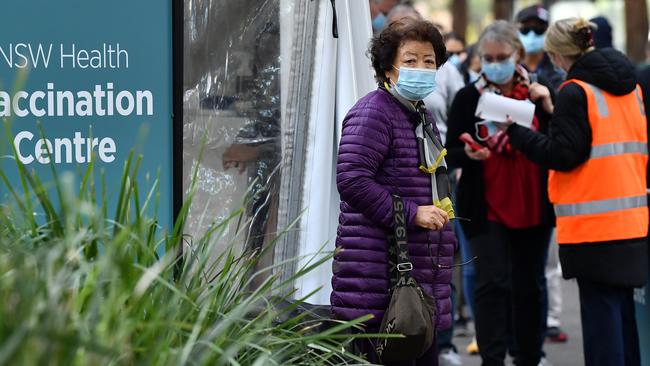Arrival of potent Delta mutation raises stakes for our Covid vaccination rollout


The mutation formerly known as the Indian variant comes in a few different types. Its most potent form is now known as Delta. This is the virus type that has devastated India and is now seeing new Covid-19 cases rise by more than 6000 a day in Britain, despite 75 per cent of adult Brits being vaccinated.
We don’t know yet whether this rise in cases will lead to a new rise in deaths.
Delta replaced the other variants in India and Britain because it was so much more effective in spreading itself.
Because it is a rich, first-world country, Delta has been studied more reliably in the UK than elsewhere. There is good and bad news for us.
The bad news is pretty bad. Delta is regarded as about 60 to 70 per cent more infectious than the Kent variant, which it replaced, and the Kent variant itself was substantially more infectious than the original Wuhan virus, which killed about 900 Australians, including 800 in Victoria’s infamous second wave.
Public Health England believes that an unvaccinated person who gets the Delta variant is more than 250 per cent more likely to end up in hospital than someone who gets the Kent variant, and that was more severe than the Wuhan virus.
The reason that is such bad news for us is because Delta has arrived in Australia, with 10-odd cases of it in Victoria that we know about. We don’t know how it got here. Most important, we are still mostly unvaccinated. Some five million Australians have had one dose of vaccine. Full vaccination occurs some weeks after the second dose.
In Victoria alone, some 42 per cent of those over 70, and nearly 60 per cent of those over 50, have not received even a single vaccine jab. Almost all Covid-19 deaths happen in people over 50. So we are still highly vulnerable.
Therefore, public health authorities do need to be extremely cautious about a Delta outbreak. The Wuhan virus had an R0 rate of about two to three. That is, without social distancing, each person will infect two or three others. The comparable figure for the Kent variant was about four, and for Delta it’s five or six.
There is other bad news about Delta. It’s more transmissible among kids than earlier variants, and more severe in kids when they catch it.
However, there is also good news. Even though Delta is more vaccine resistant than other variants, only about 4 per cent of those in Britain who have been hospitalised with it have had their two jabs.
So the imperative in Australia is overwhelming and obvious. Every sane person needs to get vaccinated as soon as possible.
One consequence of Delta’s much greater transmissibility is that herd immunity probably requires a vaccination rate of over 80 per cent.
Throughout Asia, those nations that, like Australia, had kept community spread of the virus very low, such as Taiwan, Thailand and Japan, are now typically in trouble because they were way too slow in vaccination. It’s one thing to keep the deadly Wuhan variant under control, it’s much, much harder to do the same with the Delta variant. The Vietnamese have identified a new variant that combines the worst of Delta and the worst of the South African virus.
In AstraZeneca, we did not get the best vaccine. It’s less effective than Pfizer and has some rare side effects. However, it would be absurd to criticise the Morrison government for this.
The booster shot we will all need next year will be crucial in combating Delta and new variants that will emerge by then. We may well transition away from AstraZeneca.
Estimates in the UK are that 400,000 people who have recovered from Covid-19 are suffering long Covid. Some US studies suggest 10 per cent who recover will suffer long Covid-19 at least for 12 months and perhaps permanently. For the moment, our strategy is simple – get vaccinated as fast as possible and keep the virus out, probably until we reach something like 70 per cent vaccination. Even then it won’t be open slather.
Delta is replacing the other strains because, in virus terms, it is more successful. Who knows what ultimately replaces Delta?






Despite our globally enviable low Covid-19 case numbers, Australia remains extraordinarily susceptible to a Delta swampland of the most powerful Covid-19 mutation so far.